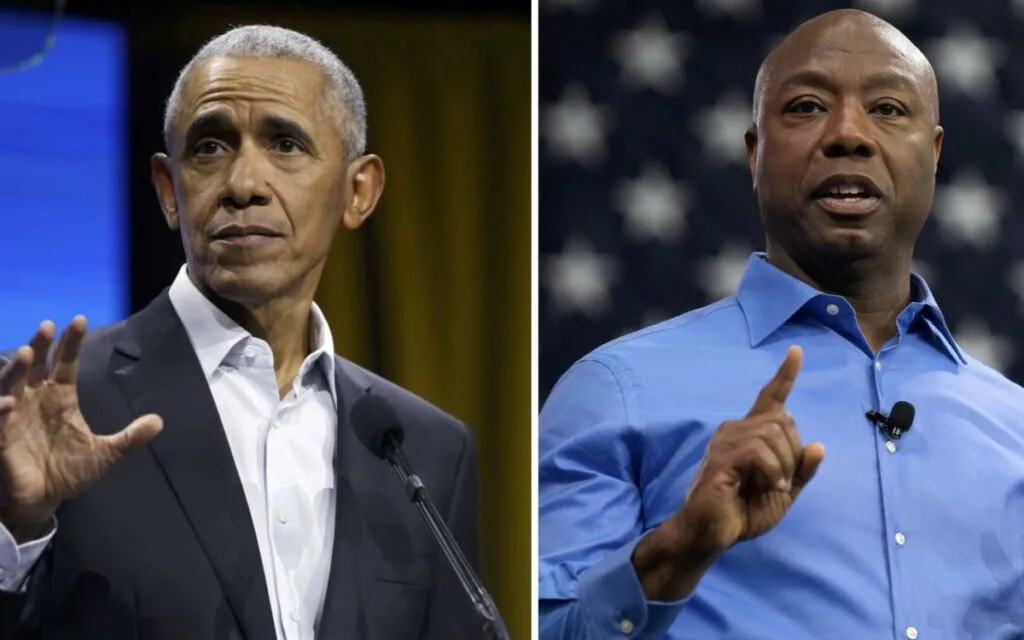
Pictured are former President Barack Obama and Senator Tim Scott (right), who is currently running for the 2024 Republican presidential nomination. Photo credit: Getty Images/Spencer Platt and Getty Images/Allison Joyce
A recent dust-up in the media between former President Barack Obama and Senator Tim Scott of South Carolina, running for the 2024 Republican presidential nomination, provides the American political observer with a burning question. Who is more authentic about the Black experience in America: Obama or Scott? As an American-trained historian, I have written about this repeatedly, including in my Master’s thesis, The Lynching of Willie Earle, about a Black cab driver killed in 1947 in South Carolina. I do not come to this topic light-heartedly nor without a strong dose of humility. I respect both perspectives, but I acknowledge the differences.
The controversy began with a comment Obama made in a recent podcast interview. In the exchange, Obama, the first Black US president, said that while presenting a hopeful message on race relations was important, “that has to be undergirded with an honest accounting of our past and our present.” The former chief executive went on to say, as reported in The Guardian, “There’s a long history of African American or other minority candidates within the Republican party who will validate America and say, ‘Everything’s great, and we can make it,’” Obama told the Democratic strategist David Axelrod on the CNN-hosted Axe Files.
He added that he thought Nikki Haley “has a similar approach.” In the article, the writer further suggests Obama described Scott and Haley’s approach as necessary if they were to gain traction in the Republican contest: “Obama said there was sometimes a tendency among Republican candidates to gloss over the effects of racism, arguing that candidates need to address racial disparities to be taken seriously on the subject of American unity.” The former two-term president rose to prominence after his 2004 Democratic Convention speech where he claimed there were not two Americas. I remember listening on that summer’s eve almost 20 years ago as Obama’s rhetoric split through the hardened shell of a country living in two camps. The young state senator’s words echo today:
“Yet even as we speak, there are those who are preparing to divide us, the spin masters and negative ad peddlers who embrace the politics of anything goes. Well, I say to them tonight, there’s not a liberal America and a conservative America – there’s the United States of America. There’s not a Black America and white America and Latino America and Asian America; there’s the United States of America. The pundits like to slice-and-dice our country into Red States and Blue States; Red States for Republicans, Blue States for Democrats. But I’ve got news for them, too. We worship an awesome God in the Blue States, and we don’t like federal agents poking around our libraries in the Red States. We coach Little League in the Blue States and have gay friends in the Red States. There are patriots who opposed the war in Iraq and patriots who supported it. We are one people, all of us pledging allegiance to the stars and stripes, all of us defending the United States of America.”
I accepted the future president’s words that night and I do now, but in criticizing Scott and Haley and any Republican candidate of colour (half of them are not white), he must own his words himself. Instead, the former chief executive seems to have become divorced from what he once stood for. Instead of promoting the idea of America as a land of hope and opportunity, a country whose constitution still needs to live up to its principles, Obama seems to have become part of the grievance coalition, commenting later in the article that Scott’s approach does not include “a plan for how do we address crippling generational poverty that is a consequence of hundreds of years of racism in this society, and we need to do something about that… If that candidate is not willing to acknowledge that, again and again, we’ve seen discrimination in everything from … getting a job to buying a house to how the criminal justice system operates,” he added.
There is no argument that a history of racism has riddled America, but the past 60 years have been spent spending money on correcting these wrongs. Senator Scott pushed back quickly. In a Twitter post on June 22, he wrote, “Let us not forget we are a land of opportunity, not a land of oppression. Democrats deny our progress to protect their power. The left wants you to believe faith in America is a fraud and progress in our nation is a myth. The truth of MY life disproves the lies of the radical left,” Scott continued. “We live in a country where little Black and brown boys and girls can be president of the United States. The truth is – we’ve had one and the good news is – we will have another.”
This issue remains a hot one in the United States and will be a central feature of the upcoming national debates, whether for nomination positions or the presidency. Unfortunately, both camps have allowed torrid rhetoric to overwhelm the evidence. Commentators on The View and other left-wing sources insist that people of colour face mounting racism in America. The facts indicate that there are isolated cases, not systemic practices. Weekly, public figures are forced to resign, apologize, or enter training if they use any type of racial trope. Some of the most famous, powerful, and wealthy Americans are Black. Oprah Winfrey, LeBron James, Kamala Harris, Clarence Thomas, Obama, and Scott all come to mind and this list merely scratches the surface of the impressive place Blacks have achieved in American society.
Those who diminish Obama’s role in the history of the United States do so ignorantly, if not treacherously. While his politics moved leftward after his 2008 election, he still represented what his opponent, Senator McCain, pointed out so well after the campaign,
“This is an historic election, and I recognize the special significance it has for African-Americans and for the special pride that must be theirs tonight. I’ve always believed that America offers opportunities to all who have the industry and will to seize it. Sen. Obama believes that, too. But we both recognize that though we have come a long way from the old injustices that once stained our nation’s reputation and denied some Americans the full blessings of American citizenship, the memory of them still had the power to wound. A century ago, President Theodore Roosevelt’s invitation of Booker T. Washington to visit — to dine at the White House — was taken as an outrage in many quarters. America today is a world away from the cruel and prideful bigotry of that time. There is no better evidence of this than the election of an African-American to the presidency of the United States. Let there be no reason now for any American to fail to cherish their citizenship in this, the greatest nation on Earth.”
Those who think Senator Scott can be mocked or ridiculed fail to honour Obama’s remarks in 2004, the significance of his rise to power in 2008, his two terms as president, the doors that have been opened for people of all races in America, the enduring legacy of a nation that still appeals to its best hopes, and the memory of John McCain. McCain and Scott seem to echo one another, and Obama once sang a verse or two from the same hymn book.
There will always be room for debate and discussion about race in America, but to deny the progress that has been made seems to betray the Obama imprint and belittle Scott’s chances at being the first Black Republican president.

Dave Redekop is a retired elementary resource teacher who now works part-time at the St. Catharines Courthouse as a Registrar. He has worked on political campaigns since high school and attended university in South Carolina for five years, where he earned a Master’s in American History with a specialization in Civil Rights. Dave loves reading biographies.

